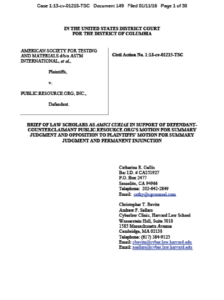 This week, the Harvard Law School Cyberlaw Clinic, on behalf of a group of esteemed law scholars, filed an amicus brief (pdf) in the United States District Court for the District of Columbia in American Society for Testing and Materials (ASTM) v. Public.Resource.org. Amici argue in the brief that model codes incorporated into law are not, and should not be, copyrightable. Several standards developing organizations (SDOs) – including ASTM, theNational Fire Protection Association (NFPA), and the American Society of Heating, Refrigerating, and Air Conditioning Engineers (ASHRAE) – filed the lawsuit against Public Resource back in 2013, alleging copyright and trademark infringement. After a lengthy discovery process, the federal District Court in D.C. is currently considering motions for summary judgment from both parties.
This week, the Harvard Law School Cyberlaw Clinic, on behalf of a group of esteemed law scholars, filed an amicus brief (pdf) in the United States District Court for the District of Columbia in American Society for Testing and Materials (ASTM) v. Public.Resource.org. Amici argue in the brief that model codes incorporated into law are not, and should not be, copyrightable. Several standards developing organizations (SDOs) – including ASTM, theNational Fire Protection Association (NFPA), and the American Society of Heating, Refrigerating, and Air Conditioning Engineers (ASHRAE) – filed the lawsuit against Public Resource back in 2013, alleging copyright and trademark infringement. After a lengthy discovery process, the federal District Court in D.C. is currently considering motions for summary judgment from both parties.
SDOs are groups – generally non-profits – that, with the help of experts and volunteers, promulgate model codes and standards to address the needs of particular technical fields. Some of these organizations sell their codes in print and digital formats, often for steep prices.
While compliance with a model code is initially voluntary, compliance becomes mandatory when that code is incorporated into law. Such incorporation means that all citizens of a relevant jurisdiction are obligated to follow the text of the code to the letter.
Filed in: Clinical Spotlight
Contact Office of Clinical and Pro Bono Programs
Website:
hls.harvard.edu/clinics
Email:
clinical@law.harvard.edu